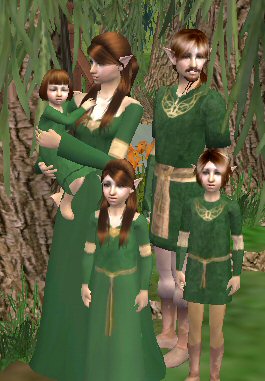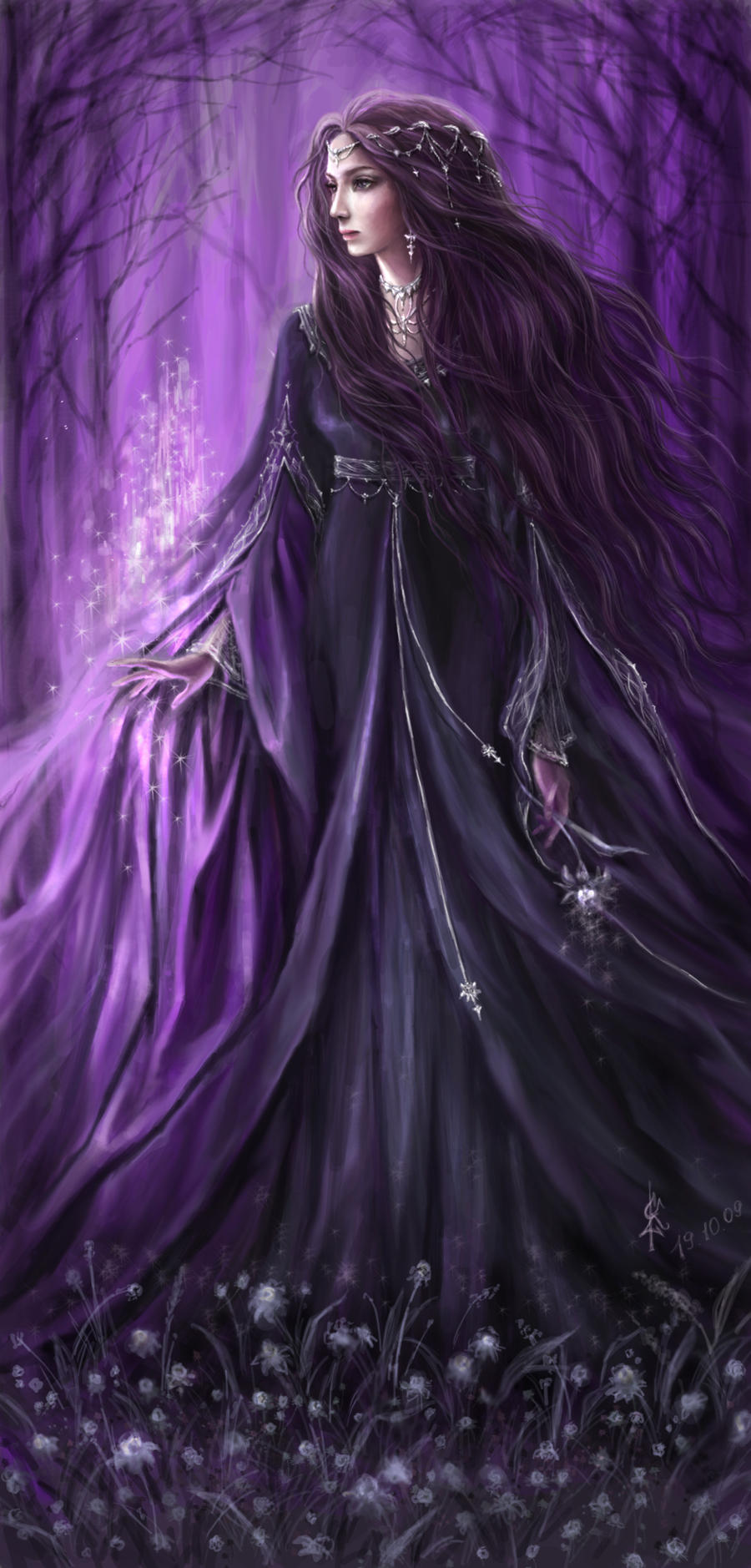"the Children of Ilúvatar are Elves and Men, the Firstborn and the Followers. And amid all the splendours of the World, its vast halls and spaces, and its wheeling fires, Ilúvatar chose a place for their habitation in the Deeps of Time and in the midst of the innumerable stars."J. R. R. Tolkien, Ainulindalë
From the Christopher Tolkiens' collection of his fathers unpublished drafts called "Morgoth's Ring" comes "OF THE VALAR AT ITS MAKING", Aelfwine's (narrator's) Preamble:
"The Eldar grew in bodilyform slower than Men, but in mind more swiftly. They learned to speak before they were one year old; and in the same time they learned to walk and to dance, for their wills came soon to the mastery of their bodies. Nonetheless, there was less difference between the two Kindred's, Elves and Men, in early youth; and a man who watched elf-children at play might well have believed that they were the children of Men, of some fair and happy people. For in their early days elf-children delighted still in the world about them, and the fire of their spirit had not consumed them and the burden of memory was still light upon them.
 Despite the similarities or appearance, Men find elf-children strange: too verbal, too sage, too graceful. The chapter immediately goes on to mention small limbs and stature, skill in words and grace in motion. At the end of the third year, Men outstrip the Elves in stature, while elves "lingered in the first spring of childhood". By age 20, elves appear no more than 7. They attain full stature and shape between age 50 and age 100.
Despite the similarities or appearance, Men find elf-children strange: too verbal, too sage, too graceful. The chapter immediately goes on to mention small limbs and stature, skill in words and grace in motion. At the end of the third year, Men outstrip the Elves in stature, while elves "lingered in the first spring of childhood". By age 20, elves appear no more than 7. They attain full stature and shape between age 50 and age 100.One oddity here is that few of us role-players are old enough to easily be anything but a very young elf, causing an odd gap between what experiential wisdom we are capable of as players and what we should be playing. However, there is a nice ameliorating factor to that in this particular "Age of the Two Trees" RP:
"For Elves and Men are the Children; and since they [the Ainur] understood not fully that theme by which they entered in the Music none of the Ainur dared to add anything to their fashion. For which reason the Valar are to these kindreds rather their elders and their chieftains than their masters;
This nicely lays out the role of Ainur compared to Elves: guides, not masters; kindred, not elders. I've described it as "Regents for the children of the King, raising the children to take on ruler-ship at maturity." JRRT has this to say on that:
"if ever in their dealings wth Elves and Men, the Ainur have endeavored to force them when they would not be guided, this has seldom turned to good, howsoever good their intent.In a way JRRT is making a rule about education and child-rearing: "Force, when it happens, fails." It goes to back to RP when you are playing a "mature, full grown elf", in this age of the Trees, the race of elves is still in childhood and developing, giving all us RP'ers under the average ave of 75, (this only aged enough to play a young elf) the modifier of elven RACIAL immaturity, making our ages just about right to be elf children or grown elves in the child hood of the race.
From the Christopher Tolkiens' collection of his fathers unpublished drafts called "Morgoth's Ring" comes these bits of Ainulindalë version C:
"Then Ilúvatar spake, and he said: "Behold I love the world, and it is a mansion for Eldar (Elves) and Atani (Men). But the Elves shall be the fairest of earthly creatures, and they shall have and shall conceive more beauty than all my children, and they shall have greater bliss in this world."
"Dying [Eldar] are gathered in the halls of Mandos in Valinor, whence they often return and are reborn in their children."
And from the Ainulindalë version D:
"For Elves and Men are the Children; and since they understood not fully that theme by which they entered in the Music none of the Ainur dared to add anything to their fashion. For which reason the Valar are to these kindreds rather their elders and their chieftains than their masters; and if ever in their dealings with Elves and Men, the Ainur have endeavored to force them when they would not be guided, this has seldom turned to good, howsoever good their intent. The dealings of the Ainur have been mostly with the Elves, for Ilúvatar made the Eldar more like in nature to the Ainur, though less in might and stature, whereas to Men he gave strange gifts."
In JRRT's early drafts, we find a discarded word: "Valarindi" with fragments describing them as the children of the Valar, begotten of their love after their entry into Ea in Arda and numbered among the Maiar. They are the elder children of the World, and though their being began within Ea, yet they are of the race of the Ainur, who were before the world, and they have power and rank below that of the Valar only." This concept of ainu children was struck out of every later draft and is utterly unmentioned in the published Silmarillion except for one story. So if it's true that ainu can breed among themselves, it's hidden.
Wedded couples might choose one another early in youth, even as children, and the betrothal awaited the judgements of the parents.
"A year passes between the begetting and the birth of an elf-child, so that the days of both are the same or nearly so, and it is the day of begetting that is remembered year by year. For the most part, these days come in the Spring."
Childbearing is uncommon late in an elf's life. While elves do not apparently age, their energies do dwindle, and childbearing takes a great toll on the mother. This early marriage period is called 'days of the children' and is a merry part of life. To avoid the drama of single-parent-hood, the elves would bear children only in days of happiness and peace if they could.

There were seldom more than four elf-children in any one house, and only once more than six. "Their [elvish] families, or houses, were held together by love and deep feeling of kinship in mind and body; and the children needed little governing or teaching". Linguistically, elves said not "I have three children", but "three children have been added unto me", of "are with me", or "are in my house"
Physically, children naturally resemble their parents, but not necessarily spiritually. The child's fea is not derived from the parent's, but is newly made or newly re-born, according to JRRT.
After bearing Feanor, Miriel simply gave up living. "All my strength has gone into him," she claimed, then she gave up living to rest in Lorien. Morgoth's Ring has a full chapter of the Valar debating and arguing at great lengths over this act and what to do about it, since Finwë himself had moaned "Is there no healing in Valinor?"
 It was Nienna who spoke the most tellingly and eloquently, I think, even though she disagreed with Aulë thus:
It was Nienna who spoke the most tellingly and eloquently, I think, even though she disagreed with Aulë thus:"the Children are not mighty: in life they are little and can effect little; and they are young and they know Time only. Their minds are as the hands of their babes, little in grasp and even that grasp is yet unfilled. How shall they perceive the ends of deed, or forgo their desires which arise from their very nature, the indwelling spirit in the body, which is their right condition?"She went on longer, but she'd already convinced us that the Noldor of this age, while mature in body and spirit, are still as children as a race. We ainu, who can see farther in the the future, still should not force them to be anything other than what The One made them.
That is, for better or worse, how the Childhood of the Children of Ilúvatar is to be.

No comments:
Post a Comment